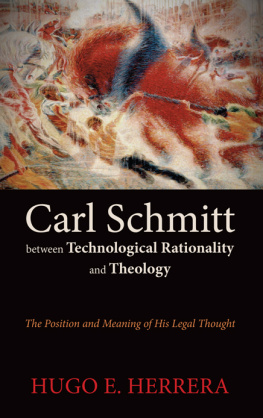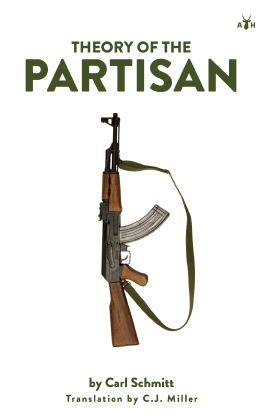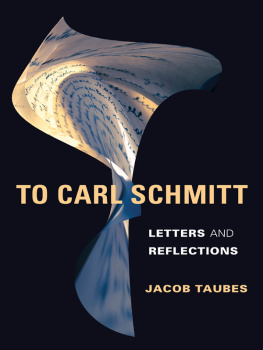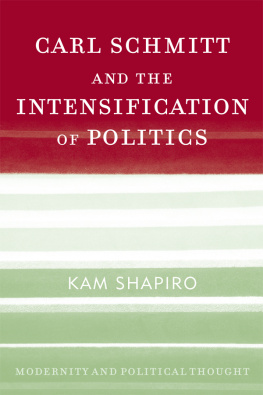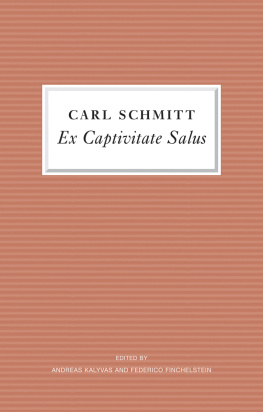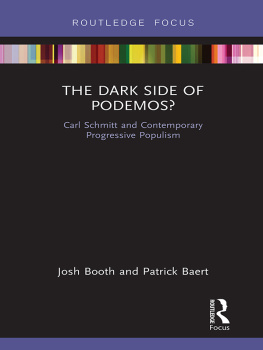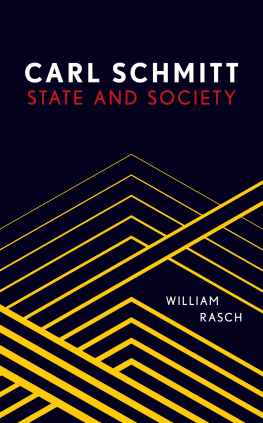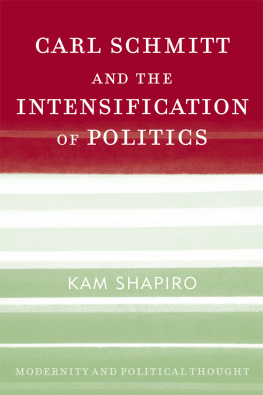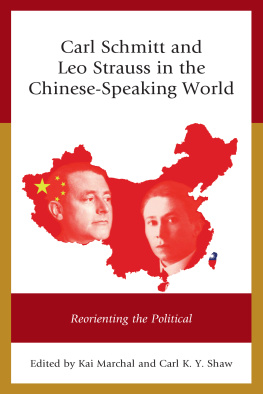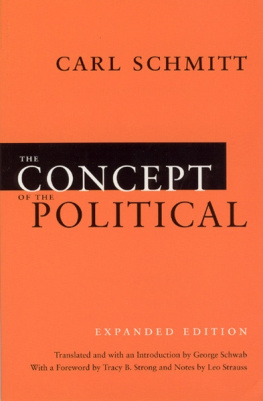Carl Schmitt
between Technological Rationality
and Theology
Carl Schmitt
between Technological Rationality
and Theology
The Position and Meaning of His Legal Thought
HUGO E. HERRERA
Umberto Boccioni, The City Rises, ca. 1910. Oil on canvas. Courtesy of the Museum of Modern Art, Mrs. Simon Guggenheim Fund.
Published by State University of New York Press, Albany
2020 State University of New York
All rights reserved
Printed in the United States of America
No part of this book may be used or reproduced in any manner whatsoever without written permission. No part of this book may be stored in a retrieval system or transmitted in any form or by any means including electronic, electrostatic, magnetic tape, mechanical, photocopying, recording, or otherwise without the prior permission in writing of the publisher.
For information, contact State University of New York Press, Albany, NY
www.sunypress.edu
Library of Congress Cataloging-in-Publication Data
Names: Herrera, Hugo, 1974 author.
Title: Carl Schmitt between technological rationality and theology : the position and meaning of his legal thought / Hugo E. Herrera.
Description: Albany : State University of New York Press, 2020. | Includes bibliographical references and index.
Identifiers: LCCN 2019030528 | ISBN 9781438478777 (hardcover : alk. paper) | ISBN 9781438478791 (ebook)
Subjects: LCSH: Schmitt, Carl, 18881985. | LawPhilosophy.
Classification: LCC K230.S352 H47 2020 | DDC 340/.1dc23
LC record available at https://lccn.loc.gov/2019030528
10 9 8 7 6 5 4 3 2 1
To
Alicia Guzmn Valenzuela
(September 19, 1926December 17, 2012)
and
Bernardo Palau Oliver
(February 3, 1925December 17, 2011)
Contents
Acknowledgments
As is the case with any book, and especially with those that take years in the making, I have incurred many debts. First of all, I would like to thank my family. Then, Jorge E. Dotti (who unfortunately passed away in 2018), Michael Marder, Rafael Simian, Manfred Svensson, Daniel Mansuy, and Joaqun Garca-Huidobro, all of whom read and commented on parts of the book. Additionally, let me express my deep gratitude to my graduate students at Diego Portales University (Chile), who took the courses where I taught the ideas presented here. I am also grateful to everyone who attended the congresses, workshops, and seminars in Valparaiso, Santiago, Wrzburg, Leiden, Curitiba, and Uberlndia, where I had a chance to discuss my views. I should like to thank the Chilean National Council for Science and Technology (CONICYT), which provided generous resources to bring the book to completion (within the framework of project no. 1190199). My gratitude extends to the Diego Portales University, where I could have enough time to do the research necessary to write this book. I must thank Rafael Simian for his translation work, and he and Cheryl Emerson for reviewing the manuscript. Finally, I should like to thank the State University of New York Press for accepting this work as part of its catalogue and the two anonymous reviewers for their comments.
Foreword
Carl Schmitt repeatedly understood himself as a jurist. In his own view, he thus situates himself between two disciplines: technology and theology. These disciplines hold two extreme positions. They do not sufficiently thematize their presuppositions. Given that, in Schmitts classification, juridical thought and the extremes of technology and theology exhaust the possible ways of human understanding, juridical thought is, for him, superior to the extremes. Schmitt identifies juridical thought with philosophy. This identification entails broadening the scope of this discipline in unusual ways, beyond juridical science strictly speaking, to include existence as a whole. Such broadening is doubly justified. Besides the fact that, for Schmitt, juridical thought is able to thematize and address problems that the two extreme disciplines cannot properly identify, existence as such is juridical for him. Existence may be described as a tension and a relation between general rules and particular cases. The law, broadly conceived, as a form of rationality that emerges with these original tension and relation in view, seems to be the most appropriate kind of understanding for elucidating existence in a hermeneutical radical manner.
Among the countless interpretations of Schmitts thought, some link it with technological rationality, while others see it as theologically determined. In a previous book, I attempted to clarify the relation between Schmitts thought and the tradition of practical philosophy (praktische Philosophie).readings and the analysis of Schmitts texts, I will try to establish whether his self-description as a jurist, according to the use he makes of this latter term, is plausible, on one hand; and, if it is plausible, whetherand in what sensehis juridical thought is relevant for elucidating human understanding in general, on the other.
Introduction
Schmitts Self-Understanding
In his work, Carl Schmitt clearly understands himself to be a jurist. He goes so far as to claim the following: I have always spoken and written as a jurist, and hence also genuinely only for and to jurists. But is Schmitt actually a jurist? Or is he rather a political theologian, or perhaps a thinker bound to a form of technological rationality, as some have said? And in what sense should one understand Schmitts words, namely, being a jurist?
In The Nomos of the Earth there is a strange thesisrepeated in The Plight of European Jurisprudence, Ex Captivitate Salus, and the Glossariumnamely, that the law lies between technology and theology.
The intermediate position held by Schmitt does not follow from a compromise between the extremes, but from a hermeneutical and epistemological consideration. Schmitt criticizes technology for ignoring the exceptionality and meaning of concrete existence. On the other hand, theology is criticized for favoring the result over methodin other words, for surrendering to an alleged substantial existence without exercising due epistemological controls.
The laws superior position in relation to both technology and theology is what justifies the unusual identification Schmitt defends between the law and human understanding in general, on one hand; and between juridical thought and a philosophy of concrete life, on the other.
Two Contemporary Interpretations
Schmitts thought has been understood either as bound to technological rationality or as theologically determined. Each of these readings bears further consideration. If either were correct, Schmitts characterization of himself would be false. He could not be understood as a jurist, and the hermeneutical scope of his thought would be restricted. As for the interpretation that links Schmitts thought to the rationality of technology, I shall concentrate on the works of Jacques Derrida; for the interpretation that sees Schmitt eminently as a theologian, I shall focus on the works of Heinrich Meier. Notwithstanding the fact that the theological interpretation has had earlier exponents, Meier has been particularly successful in placing it at the center of Schmitt scholarship. Because Derrida and Meier have been enormously influential in shaping current studies on Carl Schmitt, singling them out for discussion as representative authors of the interpretations that link Schmitt respectively with technology and theology rests on the paradigmatic character of their readings.

